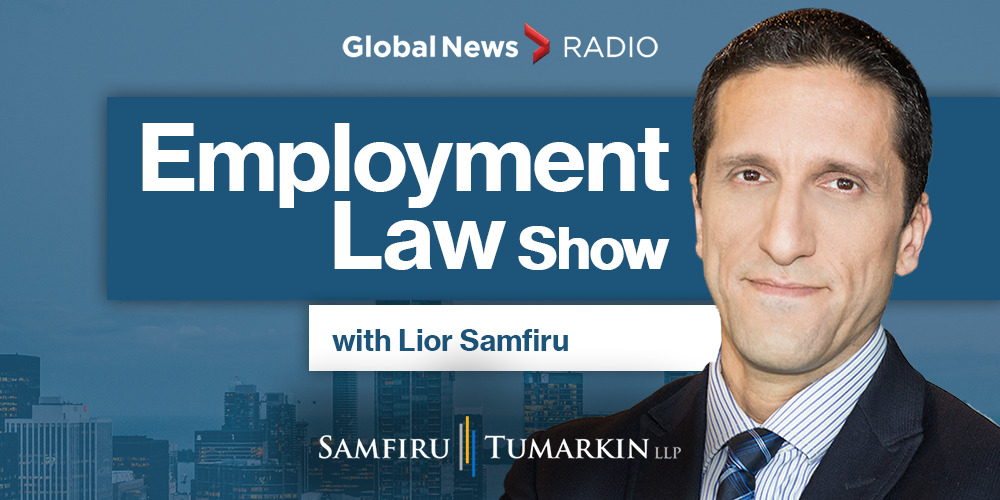Employment Law Show 980 CKNW – S3 E22

Summary
What employees should NEVER do, calls from listeners, marijuana use, gas allowance, severance rights and more on season 3 episode 22 of the Employment Law Show on Global News Radio 980 CKNW in Vancouver.
Employment Lawyer Lior Samfiru, Partner at Samfiru Tumarkin LLP, reveals your workplace rights in British Columbia on the Employment Law Show. Lior shatters myths and misconceptions about severance pay, terminations, workplace harassment, overtime pay, wrongful dismissal, constructive dismissal, duty to accommodate, and more.
What We Covered
My employer wants to move me back to a 5 day workweek from a 4 day workweek. Is the employer allowed to do this?
1:59 – An individual worked for the same company for 5 years. 2 years ago, his employer agreed to move him to a 4-day workweek. A week ago the company decided to move him back to a 5-day workweek. Is the employer allowed to do this?
Lior explains that the employer does not have a right to change the terms of his employment back to the way it was before. When the company moved him to the shorter work week 2 years ago, they agreed to update the employee’s terms of employment. This decision to revert back to the old schedule changes the terms of employment. The individual in this case can legitimately argue that he has been constructively dismissed and is owed severance pay.
My workload was doubled, which caused me to take a stress leave. What should I do?
4:55 – An individual worked for the same employer for many years. Not too long ago, the company fired one of her coworkers and transferred their duties and responsibilities to the individual. She was now working two jobs. She had to work overtime and on weekends in order to satisfy the increased workload. She eventually had to take a stress leave in an effort to deal with her growing anxiety. She asked her employer to hire another person to take the extra load off her plate, but they refused to do so. She retained Lior Samfiru to claim constructive dismissal and obtain her full severance pay. If your workload changes significantly, you should contact us to find out what your options are before accepting the changes.
PocketEmploymentLawyer.ca and when You Should Use It
8:02 – Lior Samfiru and John Scholes discuss the Pocket Employment Lawyer and why the interactive resource should be the first thing you consult if you lose your job, changes are made to your employment, something happens in the workplace or your long term disability claim is denied or cut off by the insurance company.
If you’re an Employee never make an assumption about your legal rights
10:26 – Lior Samfiru explains why employees should never assume what their employment rights are when something happens to their job or an incident occurs in the workplace. They should also not rely solely on advice from family or friends. The only way to determine what your workplace rights are is by contacting somebody who knows employment law.
My employer will no longer give me gas allowance. I will now have to pay $500 per month out of my pocket. What are my rights?
13:09 – I’ve been working at a company for the last 8 years. I was given a gas allowance, which usually amounted to $400 or $500 per month. I would be paid after submitting my receipts. A few months ago they stopped providing this gas allowance and said that the benefit was no longer available. I will now have to pay hundreds of dollars out of my own pocket.
Lior told the caller on the Employment Law Show that the company has effectively reduced his compensation by a significant amount. He might be able to claim constructive dismissal and obtain full severance pay, based on numerous factors. The caller needs to make his decision quickly, however. If he continues to work with this change in effect, he will be seen as having accepted the change to the terms of his employment, and he won’t be able to do anything about it.
If you’re an Employee never accept significant changes to the terms of your employment
17:39 – If the company makes large changes to your job and you accept those changes, either by agreeing to the change or failing to protest the changes verbally and in writing, you essentially give your employer the ability to make further changes to your job in the future. You would lose the right to protest future changes and to treat those changes as a constructive dismissal in order to obtain full severance.
If you’re an Employee never accept a verbal termination
18:56 – Accepting a verbal termination can prove to be problematic for an employee. Our employment lawyers in Vancouver have come across scenarios where the employee claims to have been terminated in a phone call with their boss, while the employer argues that the employee in fact quit! The difference between a termination and a resignation is a big one. While a termination will often provide the outgoing employee with severance pay, a resignation (if not part of a constructive dismissal situation) does not entitle an employee to severance entitlements.
A colleague smoked marijuana before arriving at work. When management found out, they asked him if he had consumed marijuana before his shift, and he confirmed it. He was let go on the spot. What are an employee’s rights where marijuana use and the workplace is concerned?
20:20 – Lior explains that a company is allowed to have a policy that states that employees cannot come to work high on marijuana or enjoy cannabis before coming to work. If an employee breaches that policy and is found to be intoxicated or under the influence while at work, an employer doesn’t immediately have the ability to terminate their employment “for cause”. A termination for cause, which would prevent the worker from accessing severance pay, is reserved for the worst workplace misconduct. In the case of marijuana use, employers should first resort to warnings or perhaps a suspension with pay. The exception to this rule is when the employee is involved in a safety sensitive position. Otherwise, an employee who is incorrectly let go “for cause” due to marijuana use and not provided with severance pay could sue for wrongful dismissal.
If you’re an Employee never resign if you don’t really want to unless you have something in writing
23:20 – A resignation is something that an employee should do voluntarily and unilaterally. If the company is pushing you to resign, know that you do not have to agree with their request. If they no longer want to employee you, they can terminate your employment and give you a severance package. If you are going to resign in response to actions by the employer (they ask you to resign, or are threatening to fire you if you don’t resign) get it in writing. Send an email to your employer telling them that you are resigning and why you are doing it when you’d prefer not to.
If you’re an Employee never call the Ministry of Labour if you lose your job
26:37 – You can call the Ministry of Labour for issues with your employer related to overtime pay, vacation pay, or statutory holiday pay (read more about when to consult Employment Standards). But when you lose your job, you should NOT call the Ministry of Labour/Employment Standards Branch. They can only advise you with respect to your MINIMUM severance pay entitlements. The difference between your minimum entitlements with the Ministry and your MAXIMUM entitlements through an employment lawyer Vancouver could be months of pay, amounting to tens of thousands of dollars!
If you’re an Employee never accept an unfair performance review
28:40 – If the company gives you a negative performance review that you feel is inaccurate and does not properly reflect the work you have done, do not quietly accept the review. If you remain silent, you will be seen as having accepted their opinion. This will make it far easier for the employer to let you go. If you are going to protest their review, express your views politely and thoroughly in writing so that you have your opposition documented.
If you’re an Employee never sign an employment contract without having it properly reviewed
30:06 – An employment contract is one of the most important documents you will ever sign as an employee. That agreement sets the rules of your employment and governs your workplace rights. Generally speaking, an employment contract is actually not a good thing to have as an employee as it often seeks to benefit the employer. It may contain a termination clause that attempts to significantly reduce your severance entitlements upon termination from your job. It may allow the company to put you on a temporary layoff. Your ability to work for a competitor may be greatly reduced.
Lior says that employment contracts can often be negotiated before they are signed.
If you’re an Employee never forget to stay in touch with your employer while you’re on a disability leave
34:02 – If you are off on a disability leave, stay in contact with your employer. Remind them that you are on a disability leave, and that you are working on getting better so that you can eventually return to work. You want to remind them that you still very much exist. Don’t forget about your employer! If you do not remain in contact with your boss, they may assume that you are not planning on returning and move to fill your position. Maintain contact over email so that you have proof.
I work overtime hours. My employer says I should be able to get the job done on time and they won’t pay me overtime. Can I get overtime pay?
35:47 – I worked as a payroll clerk and had to work extra hours to get the job done. My employer insists that I should get the job done on time and that he won’t pay overtime. Can I get overtime pay and can the employer say that I just wasn’t efficient with my time?
Lior says that if you legitimately worked overtime, the company must pay you for the overtime hours you worked. He recommends that you send the employer an email explaining the work that needs to be completed, and whether they want the employee to tend to the work during regular work hours or work overtime.
My severance letter says that if I find another job the employer will stop paying me my severance and give me half of what I was owed. Is that legal?
38:01 – Have you found another job after being let go from a previous company? If that happens, a company can choose to stop providing you with ongoing severance payments and instead give you a lump sum payment amounting to half of what is still owed to you.
Lior explains that companies generally provide severance payment by either making one giant lump sum transaction or providing salary continuance (they pay you severance on a regular basis over an extended period of time). In the case of the latter, they will move to cut off the payments and give you half of the remaining severance pay balance.
For an employee, a lump sum payment is a better option because there are no strings attached to it. With help from an employment lawyer, an employee can negotiate with the company to determine the right severance package for both employer and employee.
Experiencing an Employment Issue?
Before you call a lawyer, use the Pocket Employment Lawyer to find out if you might have a case.
Use The Severance Pay Calculator to find out how much severance pay you may be owed upon termination.
Call 1-855-821-5900, email Help@EmploymentLawyer.ca or fill out a contact form to get help now from a Vancouver employment lawyer.
Denied Long Term Disability? We Can Help.
Discover your rights when your Long Term Disability Claim is denied. Find out more here.




